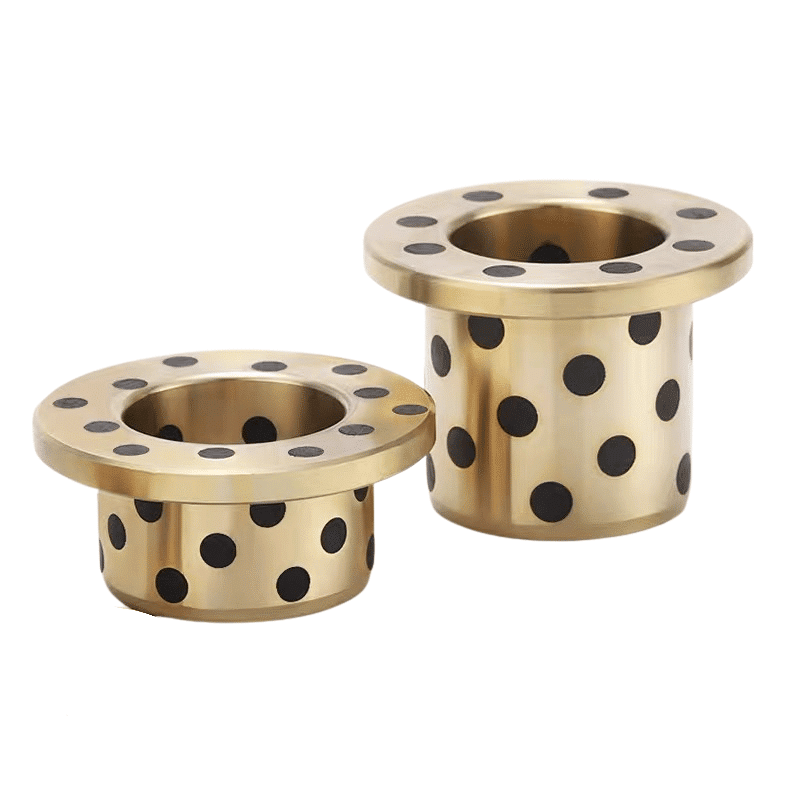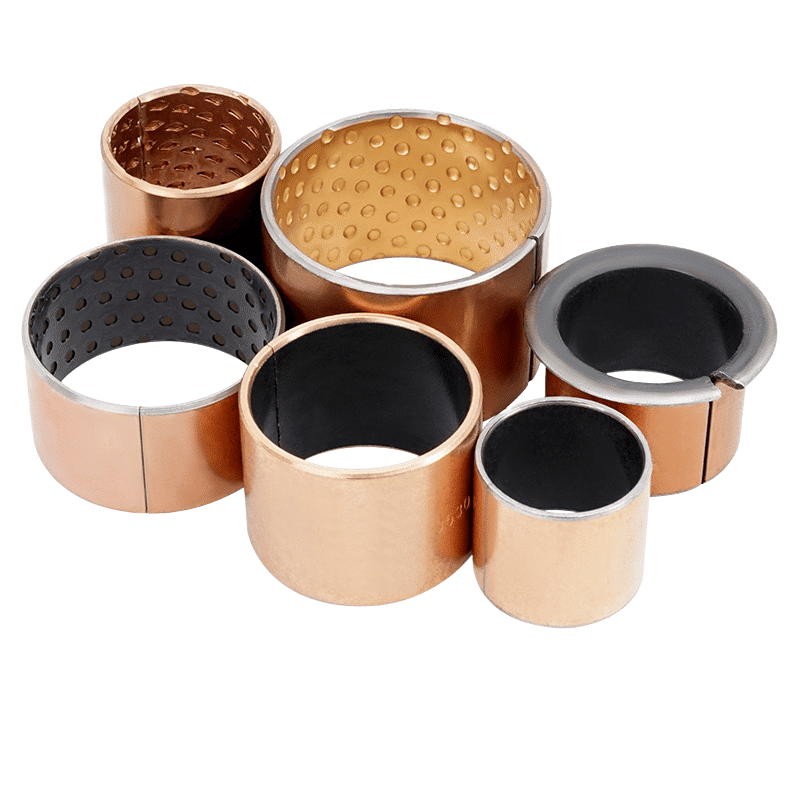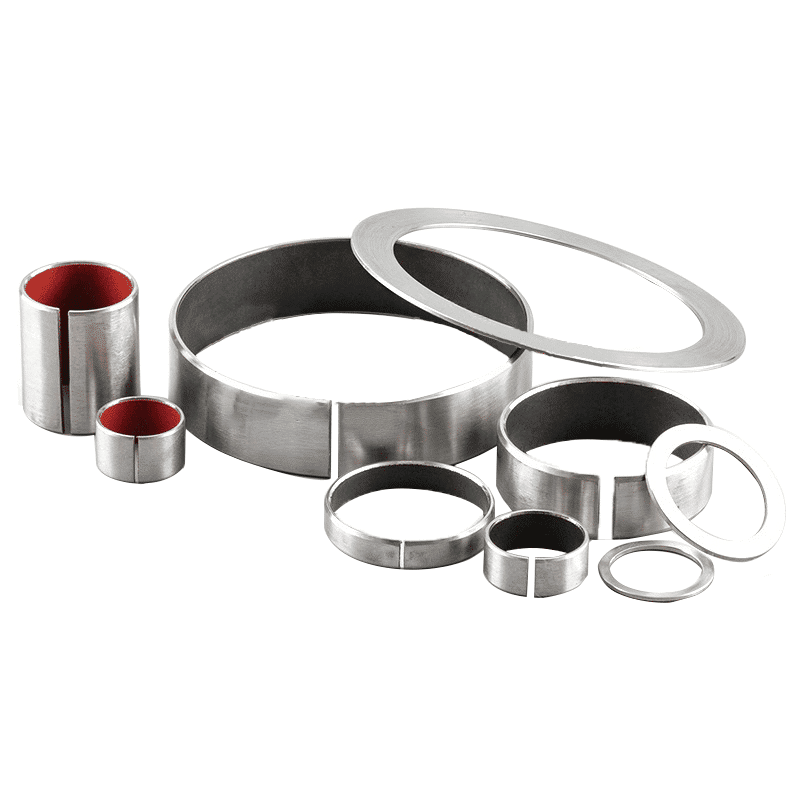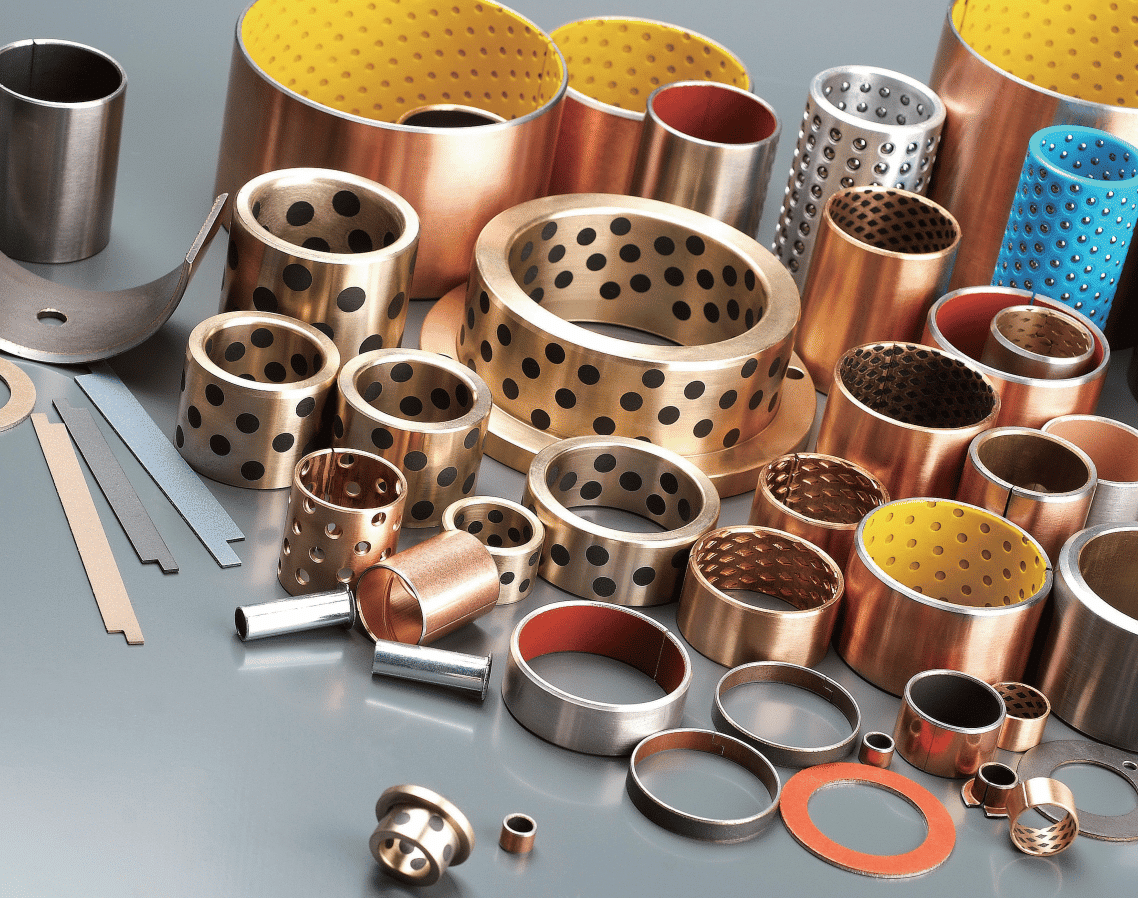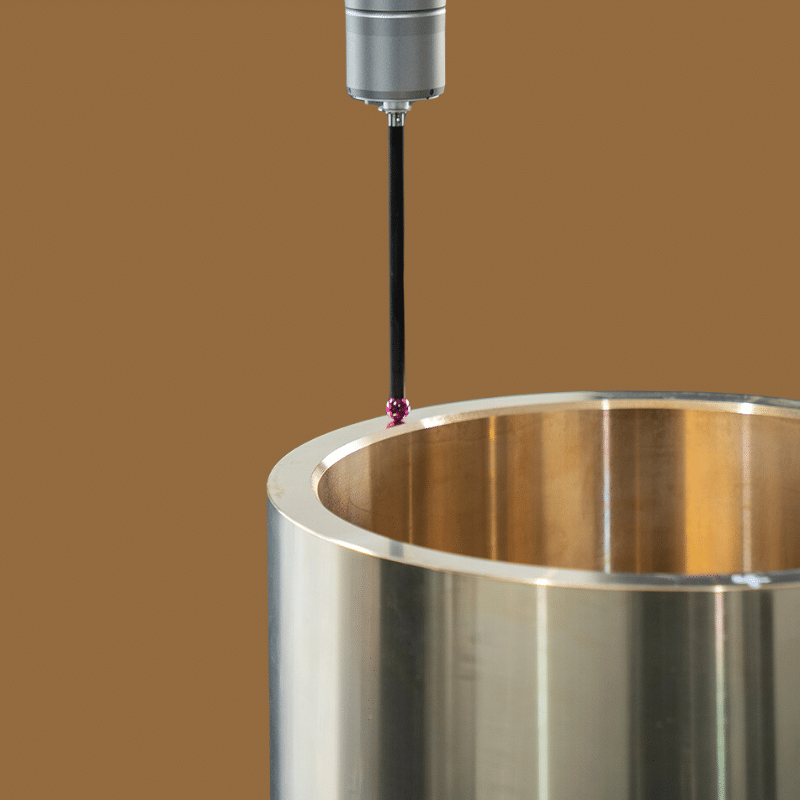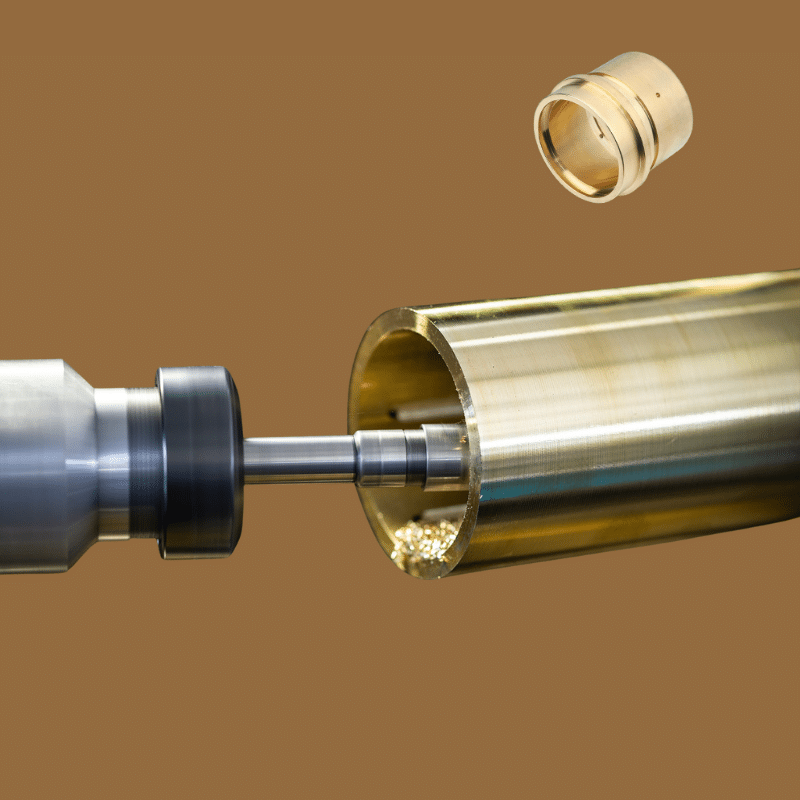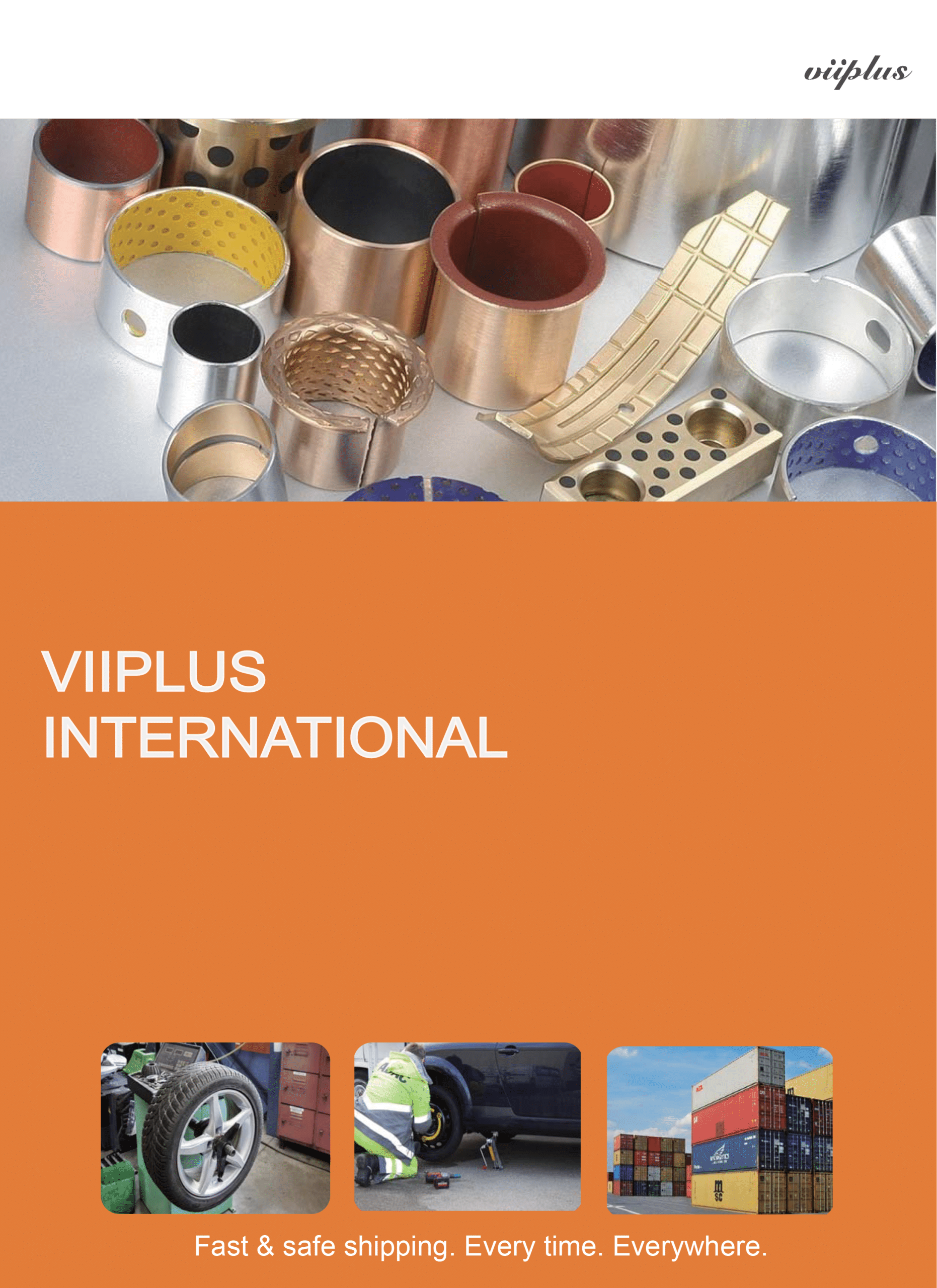What is a Bushing?
Bearings and Bushings for the Future: Precision and Customization: Our company, in bearing engineering with decades of experience, designs and develops high-precision self-lubricating bronze bearings & plain bushes. We offer a wide array of sliding bearings tailored to meet specific needs. Renowned for our expertise in custom bronze bushing and slide plate solutions, we provide an expansive selection of bushing metal alloys. Contact us today to benefit from unparalleled services at competitive prices.
What is a Bushing?
What is a Bushing?
A bushing is a type of mechanical component that is commonly used in various applications to provide support and reduce friction between two moving parts. Bushings are typically made from metal, plastic, or other materials and are designed to fit into a housing or a hole to provide a bearing surface for a rotating or sliding shaft.
Experience
Replacing a plastic bushing with bronze? Bronze bushings are more resistant to deformation and fracture than other materials.
Bearing Solutions
Bushing vs. Bearing: What is Best for Your Application?
Online Support
Selecting Bearings or Bushings for your industry!
What is a Bushing? Plain Bearings Type
Bronze bushings are made from a variety of bronze alloys and offer good wear resistance and high load capacity. They are available in both solid and split designs and can be self-lubricating or require external lubrication.
One of the most common types of bushings is the plain bearing or sleeve bearing. This type of bushing consists of a cylindrical sleeve made from a low-friction material, such as bronze, graphite, or plastic, that fits over a rotating or sliding shaft. The sleeve is often lined with a thin layer of lubricant, such as oil or grease, to further reduce friction and wear.Another type of bushing is the flanged bearing, which is similar to a plain bearing but with a flange on one end to provide additional support and stability. Flanged bearings are often used in applications where the bushing needs to be held in place or where the shaft is likely to move in a radial or axial direction.
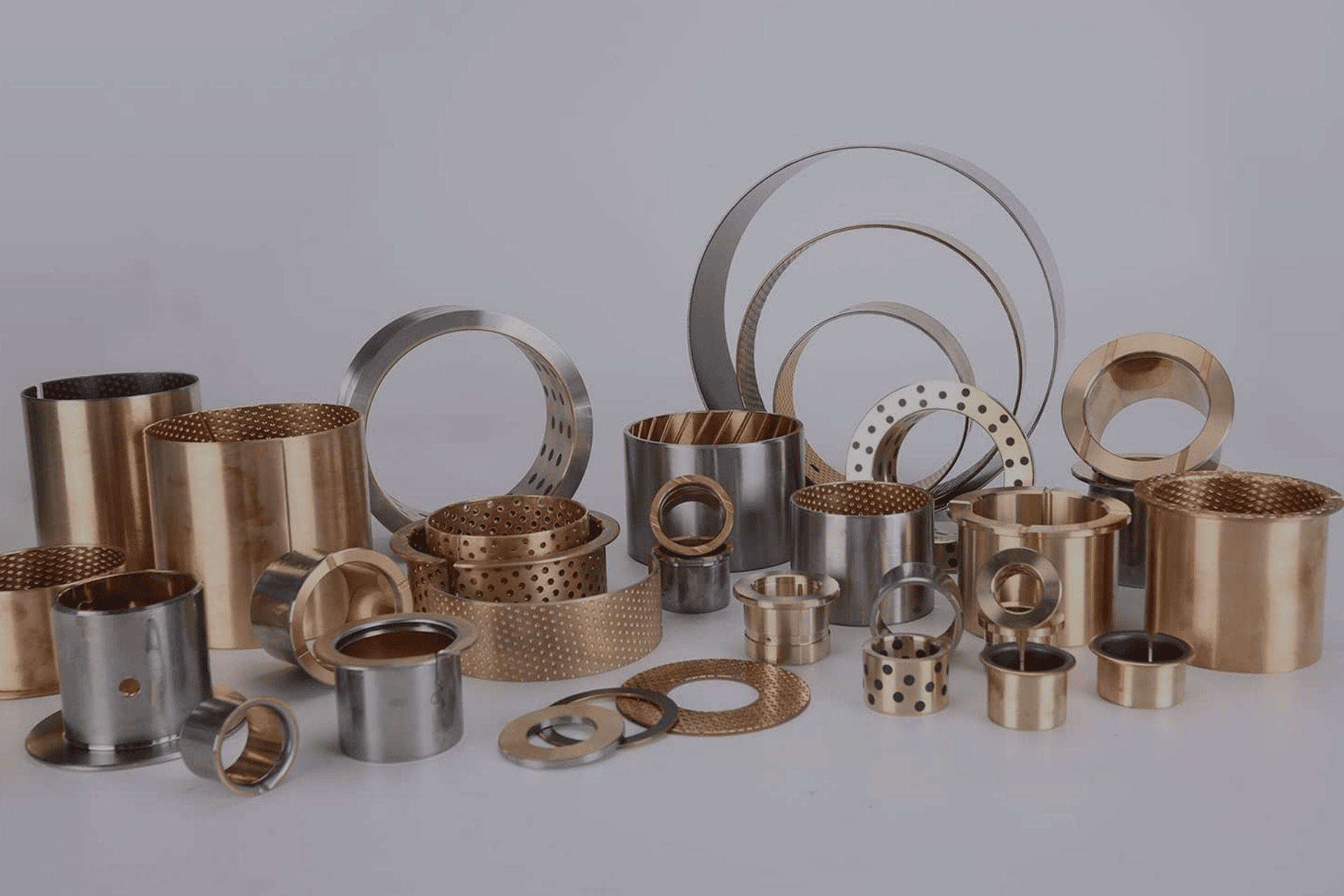
Get the Best Deals on Self-Lubricating Flange Bearings Bushings from China. Inquire Now!
What is Bushing and Bearings
Bushings can also be used to reduce noise and vibration in mechanical systems. For example, rubber or polyurethane bushings are often used in automotive suspensions to dampen the shocks and vibrations that occur while driving. Similarly, plastic or elastomeric bushings can be used in household appliances and consumer electronics to reduce noise and vibration. Bushings are similar to thin tubes and are most often used in machinery with rotating or sliding shafts to improve efficiency and reduce vibration and noise. Bushings can be used in drilling operations for drilling jigs, hydraulic external gear pumps and motors. Other common types of bushings are those used in cars, trucks and SUVs.
The difference between bearings and bushings is that bushings are a type of bearing. While the term bearing is a general term for something that allows movement between two components, a bushing is specific to a particular piece of equipment. Unlike rolling element bearings, bushings are designed as a single component.
A global manufacturer of bearings, plain bearings, and other components, including a wide range of bushings.
Choosing the right type of bushing for your application
Bushings are a versatile and essential component in many mechanical systems. They provide support, reduce friction, and help to extend the life of moving parts. Whether you are designing a new piece of equipment or repairing an existing one, understanding the different types of bushings available and their specific applications can help you make the best choice for your needs. Steel bushings are backed and offer excellent wear resistance and high load capacity. They are ideal for heavy-duty applications. Bushings are made from an acetal resin Steel backed with POM and offer good wear resistance, low friction, and high stiffness. They are ideal for applications where noise and vibration need to be minimized. Bushings are made from thin wall-bearing bushing weight metal-polymer composite material and offer excellent abrasion resistance and low friction. They are ideal for applications where impact resistance and chemical resistance are important.
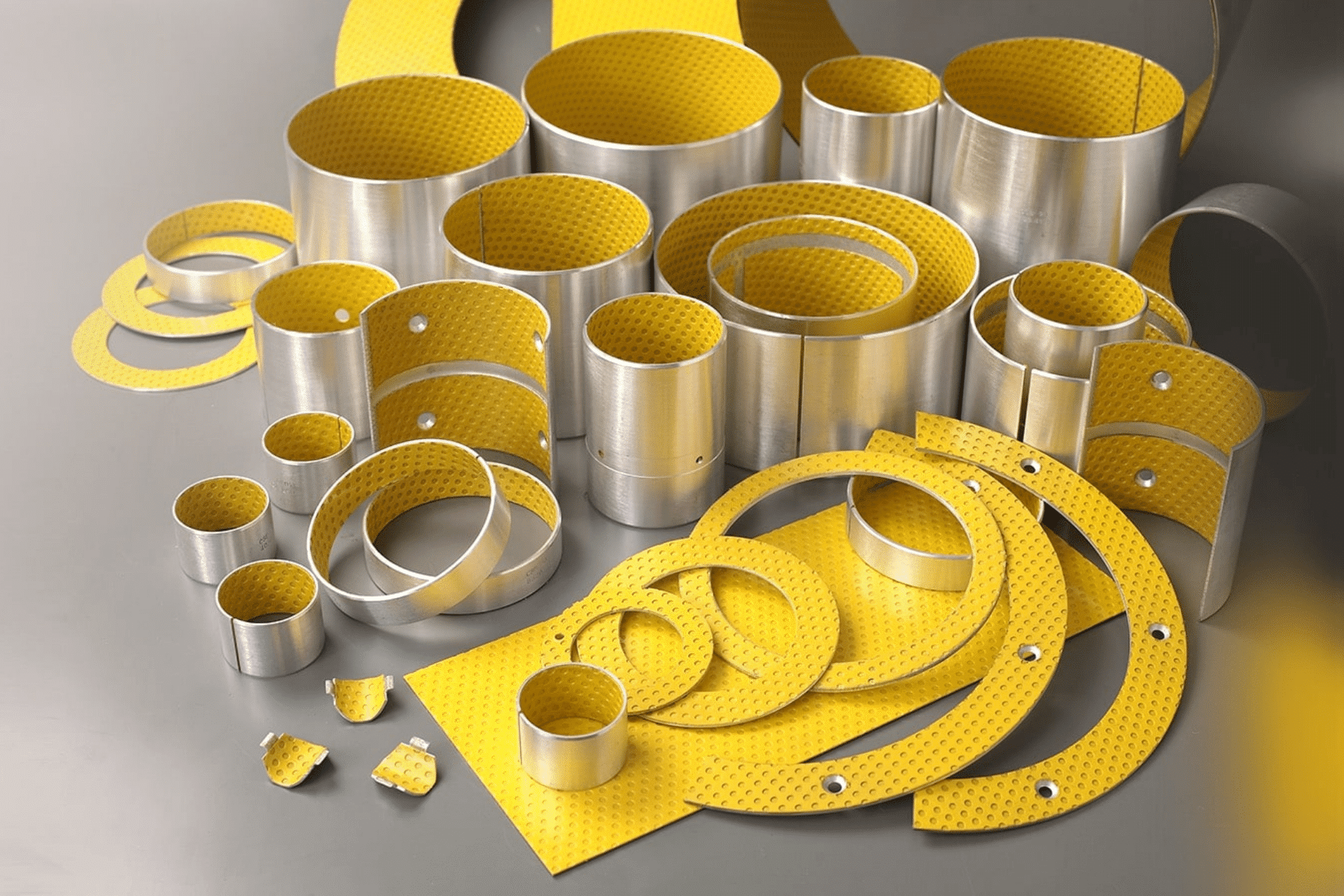
High-Quality Self-Lubricating Bearing Bushing Materials
Learn more about the variety of bushing materials offered by bronelube.com
We offer a wide range of bushing materials to suit various application requirements. Manufacturer of precision mold and die components, including a variety of bushing materials to suit different needs. Graphite bushings are made from a graphite-filled bronze material and are also self-lubricating. They are ideal for high-temperature applications, where traditional lubricants may break down. We also offer bushings made from other materials, including stainless steel, aluminum bronze, and tin bronze. Each material has its unique properties and is designed to suit specific applications. They are ideal for applications where high load capacity and good wear resistance are required.
Self-lubricating bushings are made from a cast bronze material with a solid lubricant embedded throughout. These bushings offer low friction, good wear resistance, and high load capacity, making them suitable for a wide range of applications.
-
Reduce Friction: Minimize energy loss and wear between moving parts.
-
Support Loads: Handle radial, axial, or combined loads depending on design.
-
Absorb Vibrations: Dampen oscillations to enhance system stability.
-
Align Components: Maintain precise positioning of rotating or sliding parts.
-
Material Pairing: For example, bronze against steel has a lower COF than steel against steel.
-
Lubrication: Grease, oil, or self-lubricating materials like PTFE reduce friction.
-
Surface Finish: Smoother surfaces lower friction but may increase manufacturing costs.
|
Material
|
Coefficient of Friction (Dry)
|
Coefficient of Friction (Lubricated)
|
|---|---|---|
|
Bronze
|
0.2–0.3
|
0.05–0.1
|
|
PTFE
|
0.05–0.1
|
0.02–0.05
|
|
Steel (Unlubricated)
|
0.5–0.8
|
0.1–0.2
|
|
Polymer Composites
|
0.1–0.2
|
0.05–0.1
|
-
Description: Cylindrical bushings with a simple, tubular design.
-
Applications: Electric motors, pumps, and automotive suspension systems.
-
Advantages: Easy to install, cost-effective, and suitable for moderate loads.
-
Limitations: Limited to radial loads; not ideal for high-speed applications.
-
Description: Sleeve bushings with a flange to support axial loads.
-
Applications: Gearboxes, conveyor systems, and agricultural equipment.
-
Advantages: Handles combined radial and axial loads; prevents axial movement.
-
Limitations: More complex to manufacture, slightly higher cost.
-
Description: Flat or washer-shaped bushings designed for axial loads.
-
Applications: Turbine shafts, automotive clutches.
-
Advantages: Compact design for axial load support.
-
Limitations: Not suitable for radial loads.
-
Description: Bushings split along their length for easy installation.
-
Applications: Heavy machinery, marine equipment.
-
Advantages: Simplifies maintenance and replacement.
-
Limitations: May have reduced load capacity due to the split.
-
Description: Made from materials like PTFE, graphite, or composites with embedded lubricants.
-
Applications: Food processing equipment, medical devices.
-
Advantages: Maintenance-free, ideal for dry or clean environments.
-
Limitations: Higher initial cost, lower load capacity compared to metal bushings.
|
Bushing Type
|
Load Type
|
Lubrication
|
Typical Applications
|
Cost
|
|---|---|---|---|---|
|
Sleeve
|
Radial
|
Required/Optional
|
Motors, Pumps
|
Low
|
|
Flanged
|
Radial + Axial
|
Required/Optional
|
Gearboxes, Conveyors
|
Medium
|
|
Thrust
|
Axial
|
Required/Optional
|
Turbines, Clutches
|
Medium
|
|
Split
|
Radial
|
Required
|
Heavy Machinery, Marine
|
High
|
|
Self-Lubricating
|
Radial
|
None
|
Food Processing, Medical
|
High
|
-
Bronze: Excellent wear resistance, ideal for lubricated applications.
-
PTFE : Ultra-low friction, self-lubricating, suitable for dry environments.
-
Polymer Composites: Lightweight, corrosion-resistant, and versatile.
-
Steel: High strength but requires lubrication to prevent galling.
-
Graphite: Self-lubricating, withstands high temperatures.
-
Load Capacity: Steel and bronze handle high loads; polymers are better for light loads.
-
Operating Environment: PTFE and composites resist corrosion; steel may rust in wet conditions.
-
Speed: Low-friction materials like PTFE are ideal for high-speed applications.
|
Material
|
Load Capacity
|
Friction
|
Corrosion Resistance
|
Max Operating Temp (°C)
|
|---|---|---|---|---|
|
Bronze
|
High
|
Medium
|
Moderate
|
250
|
|
PTFE
|
Low
|
Very Low
|
Excellent
|
260
|
|
Polymer Composites
|
Medium
|
Low
|
Excellent
|
200
|
|
Steel
|
Very High
|
High
|
Poor
|
300
|
|
Graphite
|
Medium
|
Low
|
Excellent
|
500
|
-
Simplicity: Fewer components than rolling-element bearings, reducing failure points.
-
Cost-Effective: Lower manufacturing and maintenance costs.
-
Compact Design: Thin-walled bushings save space in tight assemblies.
-
High Load Capacity: Metal bushings can support heavy loads.
-
Versatility: Suitable for low-speed, high-load, or oscillatory motion.
-
Higher Friction: Compared to rolling-element bearings, bushings generate more friction.
-
Lubrication Needs: Many bushings require periodic lubrication, increasing maintenance.
-
Wear Over Time: Sliding contact leads to gradual material degradation.
-
Speed Limitations: Not ideal for ultra-high-speed applications due to heat buildup.
|
Feature
|
Bushings (Plain Bearings)
|
Rolling-Element Bearings
|
|---|---|---|
|
Friction
|
Higher (sliding contact)
|
Lower (rolling contact)
|
|
Load Capacity
|
High (especially metal)
|
Moderate to High
|
|
Speed
|
Low to Moderate
|
High
|
|
Cost
|
Lower
|
Higher
|
|
Maintenance
|
Lubrication often required
|
Sealed options available
|
|
Noise
|
Quieter
|
Can be noisy
|
|
Applications
|
Oscillatory, low-speed
|
High-speed, precision
|
-
Automotive: Suspension systems, steering columns, and engine components.
-
Industrial Machinery: Pumps, compressors, and conveyor systems.
-
Aerospace: Landing gear, control surfaces (self-lubricating bushings for weight savings).
-
Consumer Goods: Hinges in appliances, bicycle pedals.
-
Medical Devices: Surgical tools and imaging equipment (self-lubricating for hygiene).
-
Match Load and Speed: Use bronze or steel for high loads; PTFE for high speeds.
-
Consider Environment: Choose corrosion-resistant materials for harsh conditions.
-
Evaluate Lubrication: Self-lubricating bushings for maintenance-free operation.
-
Check Tolerances: Ensure proper fit to avoid excessive wear or binding.
-
Regular Lubrication: Apply grease or oil as recommended for lubricated bushings.
-
Inspect for Wear: Check for signs of material loss or scoring.
-
Cleanliness: Prevent debris from entering the bushing to avoid abrasion.
-
Replace Timely: Swap out worn bushings to prevent damage to shafts or housings.
-
Advanced Materials: Nanocomposites and hybrid polymers are improving load capacity and friction performance.
-
Smart Bushings: Sensors embedded in bushings to monitor wear and temperature in real-time.
-
Eco-Friendly Designs: Biodegradable lubricants and recyclable materials for sustainability.
-
3D Printing: Additive manufacturing for custom bushing designs with complex geometries.
Understanding Bushings: The Unsung Heroes of Mechanical Efficiency
A bushing (also known as a plain bushing) is a type of bearing designed to reduce friction and wear between two moving parts, typically where one part rotates or slides inside another. Unlike ball bearings or roller bearings, a bushing is a simpler, often cylindrical or sleeve-shaped component, which doesn’t have rolling elements like balls or rollers. It works by providing a smooth, low-friction surface for the parts to move against each other.
Key characteristics of plain bushings:
-
Material: Typically made from metals (like bronze or steel), polymers, or composite materials. The material choice depends on the application’s load, speed, and environmental factors.
-
Design: A simple, smooth surface with no moving parts inside.
-
Use: Plain bushings are used in various applications, from automotive (like in suspension systems) to industrial machinery, to reduce wear and friction between moving components.
In essence, a plain bushing is a basic, durable, low-maintenance component that helps reduce friction and wear in mechanical systems.
Bushings, often referred to as plain bearings, are critical yet underappreciated components in countless mechanical systems. These cylindrical devices serve a dual purpose: reducing friction between moving parts and providing structural support to rotating or sliding shafts. Found in everything from automotive engines to industrial machinery, bushings ensure smooth operation, minimize wear, and extend equipment lifespan. Their design and material composition vary widely, tailored to specific applications—whether handling high loads, extreme temperatures, or corrosive environments. Innovations like self-lubricating “oilless” bushings further enhance their versatility, eliminating the need for external grease in hard-to-maintain systems. This article explores the engineering principles, material advancements, and specialized applications that make bushings indispensable in modern machinery.
The Fundamental Role of Bushings in Mechanical Systems
At their core, bushings act as intermediaries between moving components, preventing direct metal-to-metal contact. By absorbing vibrations and distributing loads evenly, they reduce energy loss and protect machinery from premature failure. For example, in automotive suspensions, bushings isolate noise and shocks, ensuring a smoother ride. Their simplicity belies their importance; even minor wear can lead to misalignment, increased friction, or catastrophic system breakdown. This foundational role makes material selection and precision manufacturing paramount, as bushings must balance durability with adaptability to dynamic operating conditions.
Material Selection and Self-Lubricating Innovations
The performance of a bushing hinges on its material. Bronze and brass offer excellent thermal conductivity and corrosion resistance, ideal for heavy-duty applications like marine engines. Polymers like PTFE or PEEK provide low friction and chemical inertness, suited for food processing or pharmaceutical machinery. A breakthrough in bushing technology is the rise of oilless variants, which embed lubricants like graphite or molybdenum disulfide within their structure. These self-lubricating materials eliminate maintenance needs in sealed systems—such as aerospace actuators or cleanroom robotics—where contamination from external grease is unacceptable.
Specialized Bushings for High-Performance Applications
Not all bushings are created equal. Spherical bushings, for instance, accommodate angular misalignment in machinery with shifting axes, such as construction equipment or agricultural gearboxes. Their ability to handle multidirectional forces prevents binding under stress. Hydraulic cylinder bushings, meanwhile, prioritize wear resistance and high load capacity, often incorporating hardened steel or composite layers to withstand constant pressure cycles. In high-speed applications like turbines, lightweight ceramic bushings reduce inertia and operate efficiently at extreme temperatures. These specialized designs solve niche challenges, underscoring the importance of matching bushing type to operational demands.
Customization and Industry-Specific Solutions
The diversity of modern machinery demands bespoke bushing solutions. Manufacturers now offer tailored designs, adjusting dimensions, materials, and lubrication methods to meet exact specifications. For example, the automotive industry relies on cast bronze bushings for transmission systems, while semiconductor manufacturers opt for ultra-clean PEEK variants. Split bushings simplify installation in cramped hydraulic systems, and stainless steel versions resist rust in offshore wind turbines. Collaboration between engineers and suppliers ensures bushings not only fit physically but also align with environmental, regulatory, and operational constraints.
Conclusion: The Precision Behind Every Rotation
Bushings may be small, but their impact on mechanical efficiency is profound. From their basic function of reducing friction to advanced, application-specific designs, these components are vital to the reliability of modern technology. Material innovations like self-lubricating polymers and high-strength ceramics have expanded their use into extreme environments, while customization ensures they meet the exacting standards of industries ranging from aerospace to healthcare. As machinery evolves, so too will bushing technology—driving quieter, cleaner, and more durable systems. For engineers and maintenance professionals, understanding the nuances of bushing selection is not just a technical detail but a cornerstone of operational success. Whether replacing a worn component or designing a new system, the right bushing can mean the difference between seamless performance and costly downtime.
Cost saving, choose our self-lubricating composite bushing, We manufacture plain bushing tailored to your individual needs.
Offers a wide range of high-performance bushing materials tailored to specific applications and performance needs. PTFE composite bushings, composed of a PTFE layer bonded to a metal backing, deliver low friction, high wear resistance, and excellent chemical resistance—ideal where lubrication is challenging.
We also provide composite materials that combine a PTFE-based layer with a metal backing for outstanding wear resistance, low friction, high load capacity, and reliable deformation and corrosion resistance.
Whether you require a self-lubricating PTFE material for low-speed applications, a thermoset material for high-load, high-speed, high-temperature environments, or a composite option for heavy loads and low friction, we have a solution that meets your requirements.
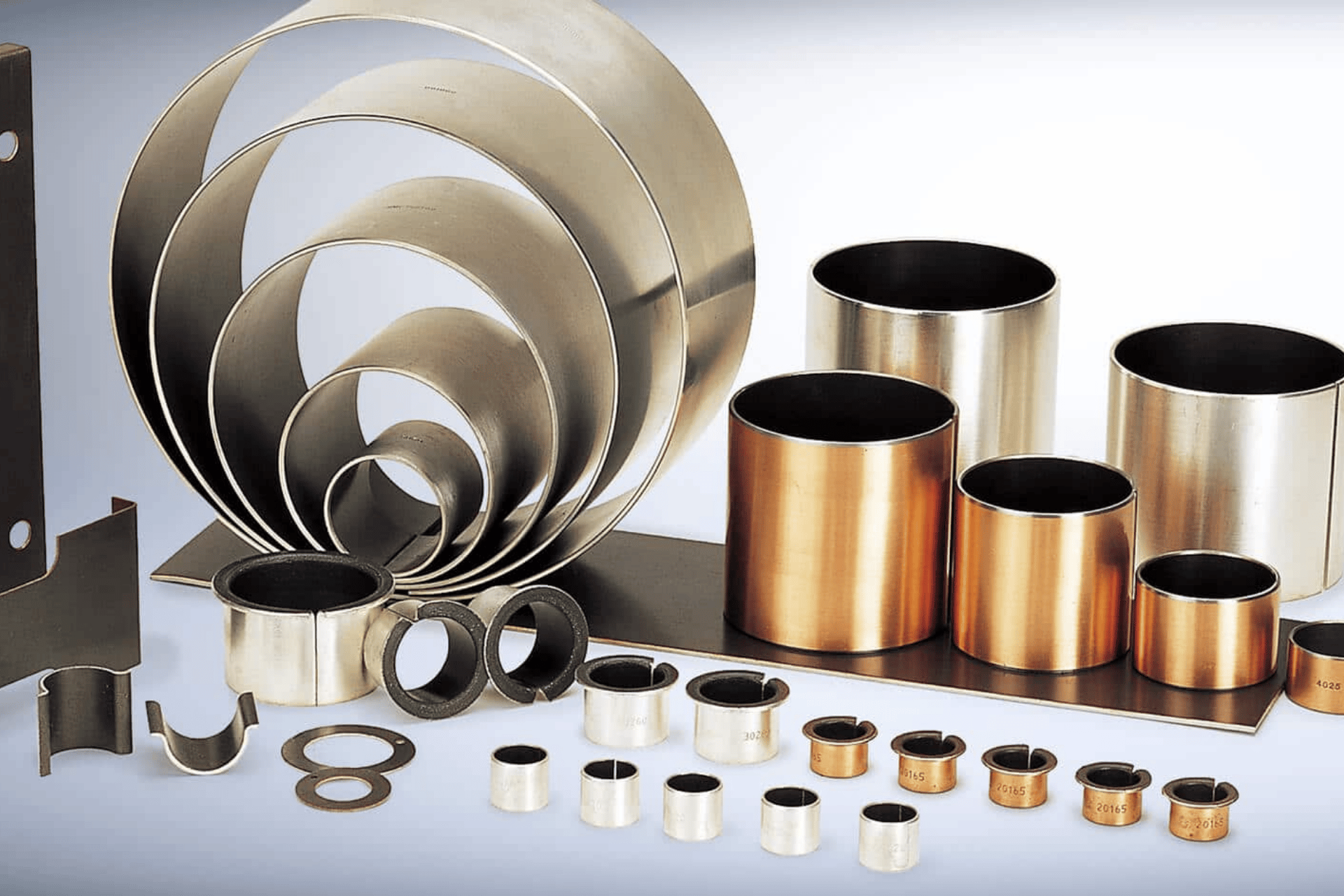
BUSHING DEAIGN
Custom Bearing Bushing We are happy to assist you!
A bushing, or sleeve bushing, is a vibration isolator that provides an interface between two parts and dampens the energy passing through it.
For a lower-cost solution needing high speed or precision, consider a self-lubricating bearing bushing. This option features the same self-lubricating design and is available as a complete part or in a customized size. We can guide you from selecting the right shape and production process to final implementation and delivery. Please contact us for more information.
High Quality
Manufacturer of high-performance polymer-based bushing materials for a wide range of applications.
A Guide to Bearings and Bushings
Our experts are ready to help you find the right solution for your specific application.

Solutions For Every Industry
Searching for Dependable Bushing Solutions? viiplus Has What You Need.

Design Guides, Materials
Bushing design, Comprehensive design manuals covering a range of self-lubricating materials used in all of viiplus’s manufacturing processes.

Technical Guides
Manufacturing On Demand, Technical Guides For Machining Design. Discover the latest in metal alloys, materials, and design tips for manufacturing custom machined and self-lubricating bearing parts.

Get Instant Quote
To receive your instant quote, simply upload your drawing file and choose your production process & bushing material.

Prototyping, Place Order
After you place your order, we will start the production process. You will receive updates when your order has completed production and is ready to be dispatched.

Receive Your custom Parts
We provide precision-inspected high-quality parts, packing lists and documents, and delivery tracking.

